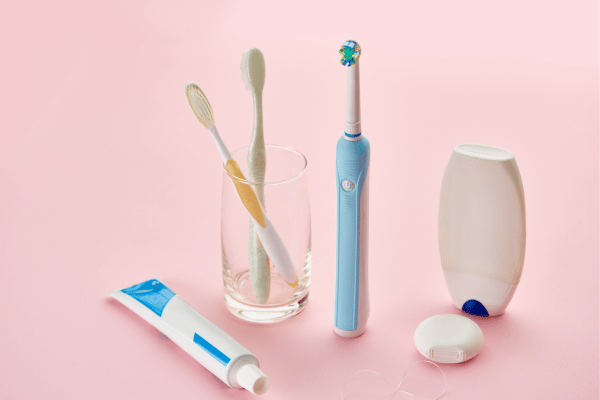
Putting it simply, the answer is yes! Once you’ve completed your teeth straightening journey and are out and about flaunting that perfect smile brimming with confidence, it’s important to remember that you still need to take precautions in order to maintain the newly achieved alignment of your teeth. Retainers play a pivotal role in ensuring just that.
In this comprehensive blog, we will discuss all you need to know about teeth retainers, including their significance, different types, and quick maintenance tips for optimal results.
What is a Retainer?
Retainer is a custom-made device to hold your teeth in place. They’re often recommended by an orthodontist or dentist after a teeth straightening treatment.
The Primary Purpose of Retainers
Nearly most teeth straightening treatments leave the gums and fibrous ligaments that hold the teeth in their position temporarily loose. It takes these structures time to tighten and adjust to the changes, leaving the teeth susceptible to movement. Whenever any kind of pressure is exerted on the teeth during activities such as chewing or grinding, the supporting ligaments are unable to provide any resistance. This can eventually result in a malocclusion and a run to the dentist’s office.
Types of Retainers

There are two basic categories of retainers available in the market. Many dental providers use a combination of both variations to keep your teeth affirm in their newfound positions.
1. Permanent Retainers
Bonded or permanent retainers consist of thin metal wires bonded to the back of your upper and lower teeth. As the name suggests, they cannot be removed; only a dentist can attach them or take them out. However, the upside is that you would never have to worry about losing them.
2. Removable Retainers
There are two types of removable retainers:
a) Hawley Retainers: They are composed of a plastic or acrylic material designed to fit the roof of your mouth, which is then attached to a thin metal wire that covers your teeth to secure them in place.
b) Clear Retainers: Made up of smooth BPA-free plastic, these custom-made clear retainer trays comfortably slip over your teeth, providing you with a discreet teeth retention experience - no one will ever know that you’re them!
How Long Do I Need to Wear Retainers?
The duration of retainer wear varies from person to person and depends on several factors, including:
- Orthodontic Treatment: The complexity of your initial misalignment and the type of orthodontic treatment you received can influence how long you'll need to wear retainers.
- Age: Younger individuals may need to wear retainers for a longer period as their bones are still growing and changing.
- Compliance: Consistently wearing your retainers as instructed by your orthodontist is essential for maintaining the results of your treatment.
In general, for permanent teeth retainers, doctors instruct you to wear them all day and all night which won’t be difficult given that you literally can’t remove them.
For removable retainers, the suggested wear time is 22 hours a day for the first 4 - 6 months and then only at night or as instructed by your dental care provider. Whereas such retainers do come with the convenience of removing them whenever you desire, it is recommended to take them out only during mealtimes and cleaning.
Pros and Cons of Permanent Retainers
Pros
- Continuous Retention: Permanent retainers provide non-stop support without the need for patient compliance. There's no need for patients to remember to wear or remove them. This can be particularly advantageous for children, teens, or individuals with busy schedules who may struggle to adhere to a strict retainer-wearing regimen.
- You Can’t Lose Them: Since they are bonded to the back of the teeth, there's no risk of forgetting to wear them or misplacing them. You’ll never have to worry about losing your retainer in a folded napkin while enjoying a Sunday brunch with a couple of your friends.
- It’s Kind of Invisible: With permanent retainers being bonded to the lingual surfaces of the teeth, they are virtually undetectable. This makes them an ideal choice for individuals who prioritize aesthetics and prefer not to have visible orthodontic appliances in their mouths.
- Long-Term Stability: Designed to provide long-term stability, permanent retainers can last for many years with proper care and maintenance. Hence, it eliminates the need for periodic retainer replacements and makes them a cost-effective option in the long run.
Cons
- Difficulty with Oral Hygiene: Permanent retainers can make it more challenging to clean between teeth and along the gum line, increasing the risk of plaque buildup and dental issues such as cavities or gum disease.
- Potential for Breakage or Damage: While permanent retainers are durable, they can still break or become detached from the teeth due to trauma or wear over time. Repairing or replacing a broken permanent retainer may require a visit to the orthodontist and incur additional costs.
Pros and Cons of Removable Retainers
Pros
- Ease of Cleaning: Removable retainers are easy to clean since they can be removed from the mouth for thorough brushing and soaking. This helps prevent plaque buildup and maintains better overall oral hygiene compared to permanent retainers.
- Adjustability: Removable retainers can be adjusted or modified by the orthodontist to accommodate changes in the alignment of the teeth or address any discomfort experienced by the patient.
- Easy Dining: Since removable retainers can be taken out while eating, patients can enjoy their favorite foods without any dietary restrictions or concerns about damaging the retainer. This freedom enhances the overall dining experience and quality of life for individuals wearing removable retainers.
Cons
- Compliance Reliant: The effectiveness of removable retainers relies heavily on patient compliance. Patients must remember to wear their retainers as instructed. Any failure to comply with wearing instructions can lead to a relapse and the need for additional corrective measures.
- Risk of Loss or Damage: Since removable retainers are not fixed in place, there's a risk of misplacing them or accidentally damaging them. Replacement costs and inconvenience associated with lost or broken retainers can be a significant drawback for some patients.
Tips for Retainer Care

Whether they’re permanent or removable, proper care and maintenance of the retainers are essential for ensuring their effectiveness and longevity. Here are some tips to keep your retainers in optimal condition:
For Permanent Retainers
This type of retainer would be required to be cleaned as part of your regular dental hygiene routine. You’d need to make sure you brush both vertically and horizontally near the wires to remove any debris or stuck food particles. Moreover, don’t forget to floss your retainer once you’re done brushing.
For Removable Retainers
Clean your retainers by gently brushing them with a soft toothbrush and mild soap or denture cleaner at least twice a day. Avoid using hot water or abrasive cleaners, as they can damage the retainer material. Refrain from biting or chewing on your retainers and store your retainers in their designated case when not in use to protect them from damage.
Takeaway
Regardless of the teeth straightening method you’ve utilized to achieve your perfectly aligned smile, clear aligners, or traditional metal braces, what truly matters is preserving the results once you've invested your time and resources into the treatment. So, no matter how much you want to get rid of your retainers, remember they are the key for you to hold on to that radiant smile.
FAQs
1. Do kids also need to wear retainers?
Yes, if your children have recently undergone a teeth straightening treatment they would be required to wear retainers.
2. What will happen if I don't wear my retainers?
If you don’t adhere to the strict instructions provided to you regarding retainer wear, your teeth will most definitely shift to their prior position, resulting in dental misalignment.
3. Who will fit the retainers?
In the case of permanent retainers, you can get them fixed at a dentist’s office. Whereas, for clear removable retainers, many brands like ALIGNERCO offer them and the best part is that you will never have to step into the dentist’s office.
4. How long do retainers last?
If taken care of properly, permanent retainers can last up to 20 years. Whereas, Hawley retainers have a life of 8 years and clear retainers usually last a year.

